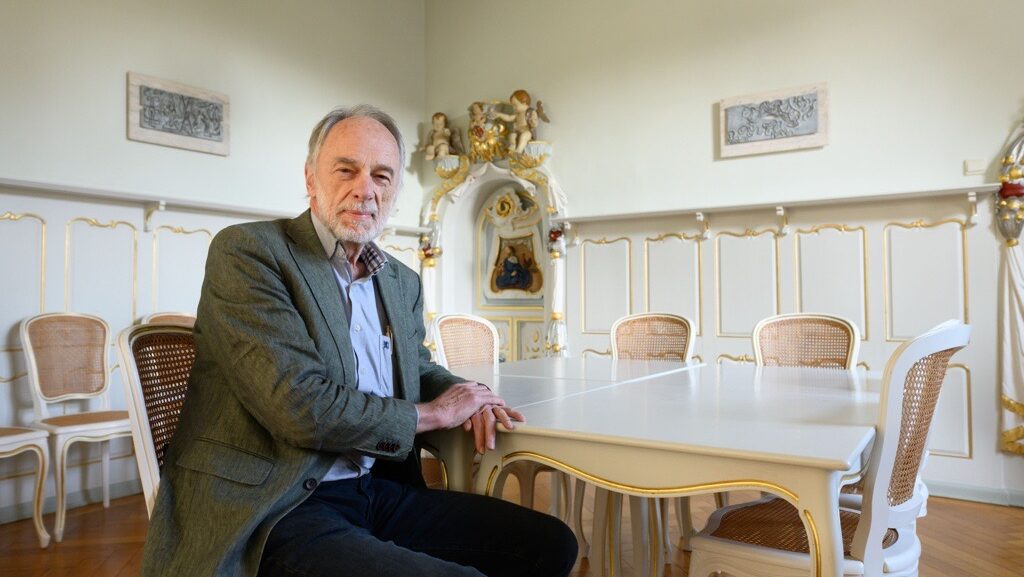ACM SIGBED Honors Reinhard Wilhelm for Pioneering Work in Real-Time and Embedded Systems

Professor Reinhard Wilhelm, Foto: Iris Maurer
We are delighted to announce that the 2025 ACM SIGBED Technical Achievement Award has been awarded to Professor Reinhard Wilhelm of Saarland University. This award, established by ACM SIGBED in 2022, recognizes significant and sustained contributions to research and system implementations in embedded, real-time, and cyber-physical systems. It honors technical achievement whose impact has been long-lasting and deeply felt across the SIGBED-relevant domains.
Although the award was scheduled to be presented at ESWEEK 2025 in Taiwan, Prof. Wilhelm was unfortunately unable to attend the ceremony. SIGBED nevertheless proudly recognizes his towering and enduring contributions.
The 2025 Award Selection Committee was chaired by Professor Tei-Wei Kuo (Delta Electronics & National Taiwan University, Taiwan) and included Professor Nikil Dutt (University of California, Irvine, USA), Professor Joerg Henkel (Karlsruhe Institute of Technology, Germany), Professor Insup Lee (University of Pennsylvania, USA), and Professor Lothar Thiele (ETH Zurich, Switzerland). The committee carefully considered the nominees and selected Professor Wilhelm in light of his outstanding career.
Professor Wilhelm is being honored for his foundational and transformative work on worst-case execution time (WCET) analysis, timing predictability and static program analysis in embedded and cyber-physical systems. His research laid the theoretical and practical basis for estimating safe upper bounds on execution times of tasks in safety-critical real-time systems—a capability without which scheduling, and certification of these systems would simply not be possible. In particular, it is widely recognized that almost all research results and techniques for timing analysis and timing certification of safety-critical systems rely fundamentally on accurate and sound WCET estimates. The work of Professor Wilhelm’s group, that includes the landmark survey “The Worst-Case Execution Time Problem” and his CACM article “Computation Takes Time, But How Much?”, helped clarify the many difficulties of timing analysis on modern processors (that include caches, pipelines, speculation, viz., features for accelerating the average case and not the worst-case timing behaviors of programs) and proposed sound methods rooted in abstract interpretation and static analysis. Moreover, he co-founded the company AbsInt GmbH, today a world-leader in timing and WCET analysis, which has seen deployment of its aiT WCET analyzer in industrial certification settings (for example aviation systems in several Airbus plane lines). In short, the entire real-time systems research community and the industrial practice of timing verification and certification quite literally stands on the shoulders of his results.
Professor Wilhelm’s career spans decades of leadership and innovation. He held the Chair for Programming Languages and Compiler Construction at Saarland University from 1978 until 2014, and during that time he made major contributions across programming languages, compilers, static program analysis and real-time systems. He was the founding Scientific Director of the Leibniz Center for Informatics (Schloss Dagstuhl) from 1990 to 2014. He is a Fellow of the ACM, recipient of the Konrad-Zuse Medal, and is a member of the German National Academy of Sciences Leopoldina. His research has delivered both deep theoretical advances (for example in shape analysis, attribute grammars, code generation) and broad practical impact through industrial tool exploitation. With more than thirty years of work, numerous highly cited papers and leadership in building the field, he is a model of sustained achievement, both for the SIGBED and also for the broader Computer Science research community.
On behalf of ACM SIGBED, we extend our warmest congratulations to Professor Reinhard Wilhelm for this extraordinary distinction and his far-reaching contributions to embedded, real-time and cyber-physical systems.
